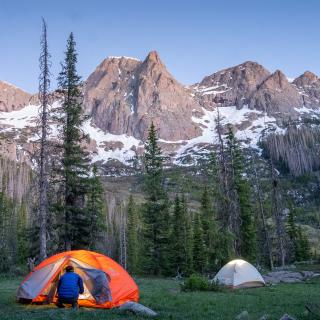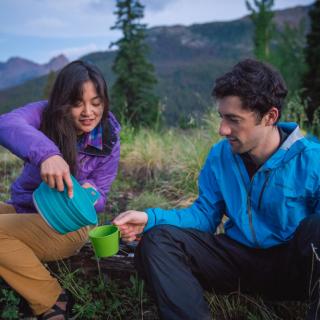Leave No Trace!
Plan Ahead & Prepare
Know the regulations and special concerns for the area you'll visit. Prepare for possible extreme weather and any emergency. Plan your trip around less busy times. Stay in small groups when possible. Repackage food to minimize waste and consolidate. Have the route mapped out ahead of time to avoid using trail markers.
Travel and Camp on Durable Surfaces
Durable surfaces include established trails and campsites, rock, gravel, dry grasses, or snow. Make your camp at least 200 feet away from any form of water. Find a good, previously established campsite, do not make your own. Walk single file in the middle of the trail, even when wet or muddy. Keep campsites small.
Dispose of Waste Properly
Pack it in, pack it out. Do not leave the place you are occupying without inspecting for trash or discarded food. Human waste must be deposited in catholes dug 6 to 8 inches deep, at least 200 feet from water, camp, and trails. Cover and disguise the cathole when finished. Pack out toilet paper and hygiene products.
Leave What You Find
Preserve the past: examine, but do not touch cultural or historic structures and artifacts. Leave rocks, plants, and other natural objects as you find them. Avoid introducing or transporting non-native species. Do not build structures, furniture, or dig trenches.
Minimize Campfire Impacts
Campfires can cause lasting impacts to the backcountry. use a lightweight stove for cooking and enjoy a candle lantern fr light. Where fires are permitted, use established fire rings, fire pans, or mound fires. Keep fires small. Only use sticks from the ground that can be broken down by hand. Burn all wood and coals to ash, put out campfires completely, then scatter cool ashes.
Make Sure You're Not Bringing Invasive Pests to Durango
Whenever you're able, take a few minutes to inspect your vehicle and outdoor gear to see if there are any unwanted, invasive insects, seeds, and mollusks.
Some of the most common invasive species include zebra mussels, the Japanese beetle, or the brown marmorated stink bug. These species or other invasive pests to Colorado pose a real threat to our landscape and ecosystem.
Respect Wildlife
Observe wildlife from a distance. Do not follow or approach them. Never feed animals. Feeding wildlife damages their health alters natural behaviors and exposes them to predators and other dangers. Protect wildlife and your food by storing rations and trash securely. Control pets at all times, or leave them at home. Avoid wildlife during sensitive times: mating, nesting, raising young, or winter.
Pledge to be a Responsible Traveler
And enter to win a return trip to Durango!
Your good deeds could earn you a Durango dream vacation, including lodging, dining, and activities. Sign the Care for Durango pledge to be a responsible traveler during your visit and you will be entered to win a return trip to Durango!





